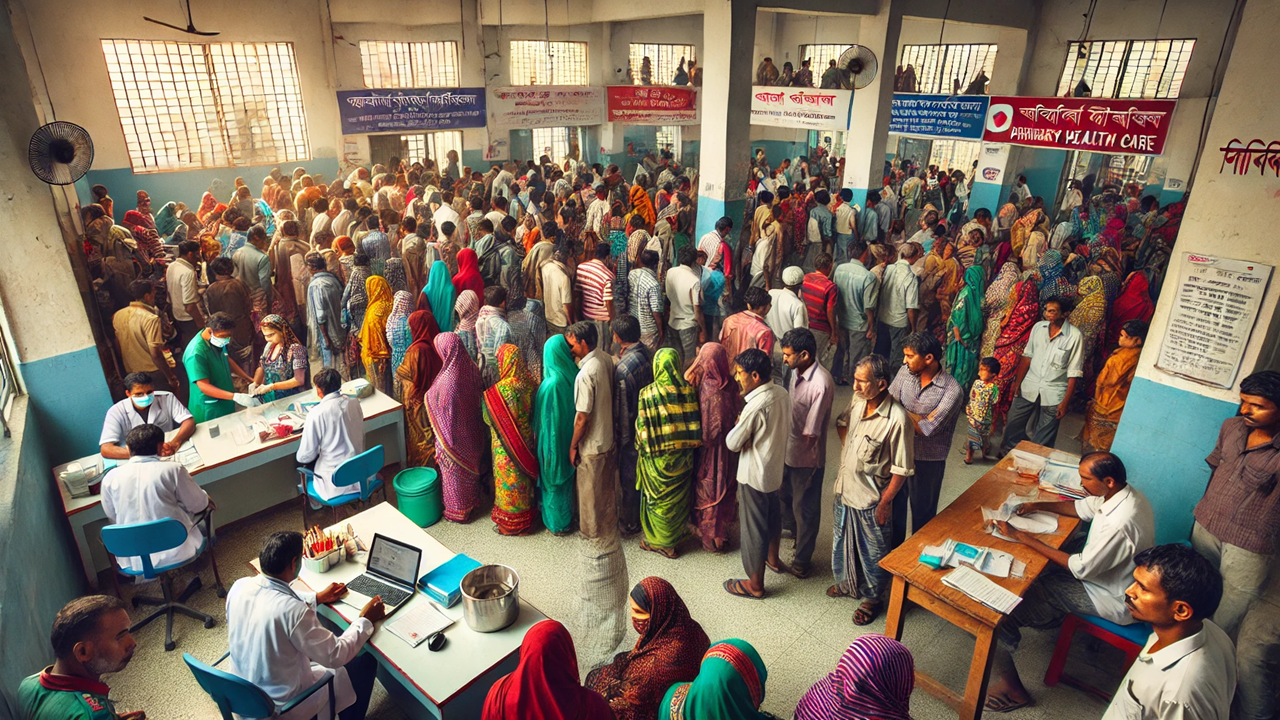Transforming Bangladesh's Health System: A Blueprint for Progress
Bangladesh has made significant health improvements over the past decade, but challenges remain. The World Bank's report highlights the need for equitable health care, efficient health expenditure, and strengthened primary care to address non-communicable diseases. Urban health services, nutritional gains, and private sector development are also critical areas for progress. Strong political leadership and strategic reforms are essential for achieving universal health coverage and sustainable health improvements.

In the past decade, Bangladesh has achieved remarkable progress in improving the health and well-being of its population. Under the diligent leadership of the Government of Bangladesh (GoB), significant strides have been made, including increased life expectancy and reduced maternal mortality rates. This journey reflects the nation's dedication to building a healthier future for its people.
The World Bank's comprehensive report, "Path to Transform Bangladesh's Health System for Better Results," highlights the milestones and lays out a roadmap for future improvements. This article delves into the key areas identified by the report, providing insights into the challenges and proposed solutions to further enhance Bangladesh's health sector.
Strengthening Health Equity
Despite impressive gains, disparities in health care persist in Bangladesh. The GoB has made commendable efforts to promote equity, but significant gaps remain. Poor people, particularly in rural areas, face greater health needs but receive fewer benefits. The uneven distribution of health facilities, gender disparities, and urban-rural discrepancies exacerbate these inequities.
The report recommends targeted and integrated programs to address these disparities. It suggests allocating resources based on needs, expanding primary health care (PHC) services in urban areas, and subsidizing medicine for vulnerable groups. Enhancing social protection programs and ensuring women hold more managerial positions in health care are also crucial steps toward achieving greater equity.
Making Health Expenditure More Efficient
High out-of-pocket (OOP) payments for health care are a significant burden for many Bangladeshis. These payments can lead to financial hardship and limited access to care, especially for the poor. The report highlights that medicines account for a substantial portion of OOP expenses, often sold without prescriptions by untrained salespeople.
To address this, the report recommends increasing public funding for health care and exploring earmarked taxes. Strengthening multisectoral collaboration and engaging the private sector through public-private partnerships (PPPs) are also crucial. Investments should focus on strategic health purchasing, pandemic preparedness, and managing non-communicable diseases (NCDs).
Tackling Non-Communicable Diseases
Bangladesh is witnessing a shift in its disease burden from infectious diseases to NCDs such as diabetes, hypertension, and cancer. These diseases are now leading causes of death and disability, putting immense strain on the health system.
The report calls for strengthening PHC services to manage NCDs effectively. It emphasizes the need for integrated, person-centered care models that improve health outcomes and facilitate referrals across the health system. Reducing financial barriers to NCD care and enhancing health promotion and prevention efforts are also critical.
Adapting to Urban Health Needs
Urban areas, particularly slums, face unique health challenges. Disparities in health outcomes between urban and rural populations are stark, with slum dwellers faring worse than their rural counterparts. Urban PHC systems are less developed due to inconsistent legal frameworks and insufficient resources.
The report recommends developing and regulating urban health services with sustainable financing models. Establishing a people-centered integrated care system and implementing comprehensive monitoring and evaluation are essential for effective decision-making and improved health outcomes in urban settings.
Building on Nutritional Gains
Bangladesh has made notable advancements in maternal and child nutrition, but challenges remain. Malnutrition, particularly child wasting and underweight children, is still a major public health issue. Slum areas exhibit worse nutritional outcomes compared to other urban and rural areas.
The report suggests expanding nutrition services through community strategies and awareness campaigns, with dedicated budgets and clear roles. Strengthening adolescent nutrition and incorporating nutrition into the Essential Services Package (ESP) are recommended. Investments in information and communication technology (ICT) and training frontline workers are also critical for addressing malnutrition.
Catalyzing Private Sector Development
The private health sector plays a significant role in Bangladesh's health system, but coordination with the public sector is limited. The report highlights the need for stronger regulatory capacity and oversight of private health providers. Addressing regulatory gaps and fostering public-private dialogue are essential for improving the quality and accessibility of health care.
Embracing Transformation
Bangladesh stands at a crossroads, with the opportunity to build on its progress and tackle remaining health challenges. The report emphasizes the need for strong political leadership, increased investment in health care, and strategic reforms to achieve universal health coverage (UHC) and meet the Sustainable Development Goals (SDGs).
By leveraging its community health workforce, demographic dividend, pluralistic health system, and robust digital health platforms, Bangladesh can achieve transformative changes in its health sector. Continued commitment from the government, partners, and stakeholders is essential for realizing these goals and improving the health and well-being of all Bangladeshis.
- FIRST PUBLISHED IN:
- Devdiscourse










